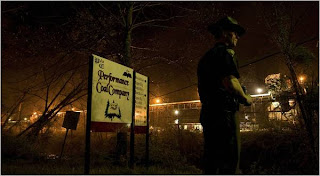
Anzac Day is upon us. I ran through Kings Park last evening where the Anzac Day Dawn service takes place. Hard to believe the size and scale of the planning for the dawn service.
Thinking about Anzac Day brings to mine James Scott's book
Domination and the Arts of Resistance in which he writes of the public rituals, performances and ceremonies- parades, memorials, state ceremonies- that the powerful use to distract attention away from the strategies they use to retain power. War of course being one of those.
I will spend the day reflecting on the horror and tragedy of war, and of Australia's history of fighting in other country's wars. I will think of my own family members who fought (and suffered) as a result of their war experiences. They had no interest in all the glorification and memorialisaion of war.
And I will think of a former neighbour of mine. He fought in New Guinea where he saw the horror of war. He told me once that "war is just ordinary men with families and children killing other ordinary men with families and children...... Unnecessary killing that’s what war is”. I wonder if his message will get spoken on Anzac Day.
A piece inspired by a conversation I had with him on the eve of the invasion of Iraq can be read
here.And I will listen to Australian music and read poetry that speaks of the horror, futility and brutality of war. One song I will play is
Eric Bogle's masterpiece of the futility of war, And the Band Played Waltzing Matilda (the versions I will listen to is the Bushwackers' version-just voice and piano-from their 1975 album and English singer
June Tabor's version featuring just her unaccompanied voice.)
I will also be listening to
John Schuman and the Vagabond Crew's
Behind the Lines a CD of Australian anti-war songs, including songs he wrote for the socio-political folk band
Redgum in the 70's and 80's, as well as covers of other Australian songs of war by Don Walker (Khe Sanh), Russell Morris (On the Wings of an Eagle), Rob Hirst and Midnite Oil (My Country) Eric Bogle (And the Band Played Walzing Matilda and No Man's Land) and Mike Rudd and Spectrum (I'll be Gone/ Someday I'll have money)
And the Band Played Waltzing Matilda
by Eric Bogle
When I was a young man I carried my pack
And I lived the free life of a rover
From the Murrays green basin to the dusty outback
I waltzed my Matilda all over
Then in nineteen fifteen my country said Son
It's time to stop rambling 'cause there's work to be done
So they gave me a tin hat and they gave me a gun
And they sent me away to the war
And the band played Waltzing Matilda
As we sailed away from the quay
And amidst all the tears and the shouts and the cheers
We sailed off to Gallipoli
How well I remember that terrible day
How the blood stained the sand and the water
And how in that hell that they called Suvla Bay
We were butchered like lambs at the slaughter
Johnny Turk he was ready, he primed himself well
He chased us with bullets, he rained us with shells
And in five minutes flat he'd blown us all to hell
Nearly blew us right back to Australia
But the band played Waltzing Matilda
As we stopped to bury our slain
We buried ours and the Turks buried theirs
Then we started all over again
Now those that were left, well we tried to survive
In a mad world of blood, death and fire
And for ten weary weeks I kept myself alive
But around me the corpses piled higher
Then a big Turkish shell knocked me arse over tit
And when I woke up in my hospital bed
And saw what it had done, I wished I was dead
Never knew there were worse things than dying
For no more I'll go waltzing Matilda
All around the green bush far and near
For to hump tent and pegs, a man needs two legs
No more waltzing Matilda for me
So they collected the cripples, the wounded, the maimed
And they shipped us back home to Australia
The armless, the legless, the blind, the insane
Those proud wounded heroes of Suvla
And as our ship pulled into Circular Quay
I looked at the place where my legs used to be
And thank Christ there was nobody waiting for me
To grieve and to mourn and to pity
And the band played Waltzing Matilda
As they carried us down the gangway
But nobody cheered, they just stood and stared
Then turned all their faces away
And now every April I sit on my porch
And I watch the parade pass before me
And I watch my old comrades, how proudly they march
Reliving old dreams of past glory
And the old men march slowly, all bent, stiff and sore
The forgotten heroes from a forgotten war
And the young people ask, "What are they marching for?"
And I ask myself the same question
And the band plays Waltzing Matilda
And the old men answer to the call
But year after year their numbers get fewer
Some day no one will march there at all
Waltzing Matilda, Waltzing Matilda
Who'll come a waltzing Matilda with me
And their ghosts may be heard as you pass the Billabong
Who'll come-a-waltzing Matilda with me?
copyright © Eric Bogle
























